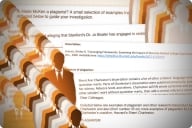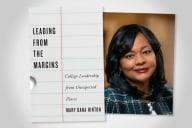You have /5 articles left.
Sign up for a free account or log in.
A simple but strict rule for getting through my workday is to avoid YouTube until after 4 p.m., and preferably later. I started to write that it is a rule "for maintaining concentration," but that's not quite right. More accurate would be calling it the minimal prerequisite for building up any concentration in the first place.
A recent test to my resolve came in the form of John Cleese's new book, Professor at Large: The Cornell Years (Cornell University Press), a selection of lectures and colloquies from his time moonlighting as an Ivy League don. It's impossible to read the book without imagining Cleese's distinctive voice and demeanor. Soon enough, the reviewer begins wondering if it might not count as research to look over the video of Cleese explaining the budget crisis at the Ministry of Silly Walks. And next year will be the 50th anniversary of the first episode of Monty Python's Flying Circus -- time to begin refamiliarizing oneself with the canon …
None of that: eyes on text, and text only. "At any one time, up to 20 outstanding intellectuals from across the globe hold the title of Andrew Dickson White Professor-at-Large and are considered full members of the Cornell faculty," says the professorship's website. When the idea of nominating Cleese for the position originally came up sometime in the late 1990s, it drew letters of support from faculty members "in various disciplines," writes Stephen J. Ceci in the volume's introduction, "from mathematics to the social sciences and humanities" -- evidence, if any more were needed, of the Python troupe's totemic significance for a generation or two of otherwise very serious people. Cleese himself identifies this as a distinctly American phenomenon: "It's funny how [Monty Python]'s more loved here in the United States than it is anywhere else … Many Americans have come up to me and said, 'You got me through my exams at college.' Friday nights they used to sit down and have a good laugh and decide life was worth living after all."
His six-year appointment, beginning in 1999, was renewed for two years; it was subsequently extended, de facto, as a Provost Professorship. The university covered his travel expenses and accommodations and seems to have gotten considerably more than it paid for in return. Besides holding lectures, workshops and screenings of his films -- not to mention providing narration for the Cornell Chamber Orchestra production of Prokofiev’s Peter and the Wolf -- Cleese participated in informal meetings with professors to discuss their work.
He "easily held his own among the scholars, asking penetrating questions on every topic," writes Ceci, who says that it "perhaps should not have surprised me given his law training at Cambridge University." Cleese refers to this in passing in one of his talks: "I am fairly precise with my use of words and I can think in terms of categories, which is all law is -- until you start practicing, and then it’s about villainy and low cunning." It bears noting that Ceci, who made the formal nomination for Cleese's appointment, is a professor of developmental psychology at Cornell. While none of the lectures in Professor at Large make any claim to expertise, Cleese's particular interest in psychology is evident throughout, and it goes beyond the terrain covered by his earlier books such as Families and How to Survive Them. A discussion between Ceci and Cleese from 2001 called "The Human Face" includes charts from a study by another Cornell psychology professor, David Dunning, on accuracy rates in the recognition of faces from lineups.
The last chapter of the book, a talk from 2017, includes Cleese's own take on Dunning's more recent research:
Now, David’s a stunning social psychologist who’s always been fascinated by how good people were at knowing how good they were at doing things; in other words, self-assessment. He carried out a series of tests with a young student called Kruger, and what they discovered was that the skillset one needs in order to know how good you are at something requires almost exactly the same skillset as it does to be good at that thing in the first place. What a wonderful corollary! It explains so much of the world: if you are absolutely no good at something, you lack exactly the skills and aptitude which you need to know that you’re no good at it. It explains a great deal because what happens as you get older, and I promise you I’m not exaggerating, is that you begin to realize, first of all, that almost nobody knows what they’re doing or what they’re talking about. Very, very few.
Confirmation, then, of the Pythons' anarcho-absurdist variety of social criticism? Not to go overboard with the idea, but there may be something to it. Consider the long-term reception of Monty Python's Life of Brian. The story of a thoroughly unextraordinary fellow in first century Judea who finds himself attracting a messianic following despite his best efforts to the contrary, the film was hugely controversial when it came out in 1979, with pickets and denunciations around the world by Catholic, Protestant and Jewish groups alike. "And we were very proud about that," Cleese says at a talk following the film's re-release in 2004, "because, as Eric Idle said, 'We've given them the first thing they've agreed on for 500 years.'"
No one who regarded Life of Brian as "foul, disgusting and blasphemous" -- to use the Rabbinical Alliance's formulation at the time -- was ever likely to accept the Pythons’ insistence that the target of their satire was fanaticism, not religion as such. I think "Sermon at Sage Chapel" from 2001 should make Cleese's sincerity on that point quite clear. But also note his own surprise in these remarks from last year:
King’s College, they had a whole weekend of a proper academic conference about the effect that Life of Brian had on the study of Christian theology. They took it absolutely seriously, yes, there’s a book out there on the conference. What was extraordinary to me was they felt that some of the jokes threw light on Christian teaching in a way that was original. It’s astounding, but that’s actually what they told me. They felt that we brought things up in the film that highlighted certain important subjects which hadn’t been discussed before.
As Cleese recalls the Dalai Lama telling him in conversation: “What I like about laughter is that when people laugh, they can have new thoughts.”
By the way, the volume Cleese mentions coming out of the King's College event is Jesus and Brian: Exploring the Historical Jesus and His Times via Monty Python's Life of Brian, edited by Joan E. Taylor and published in 2015 by T&T Clark/Bloomsbury -- a reference that should have been footnoted by the editor of Professor at Large, if it had one, which, seemingly, it does not. I want to complain, if you'll pardon the allusion.








